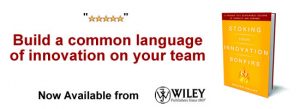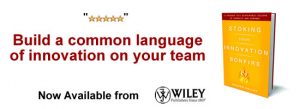The Principles of Lean Innovation
 James P. Womack, co-author of Lean Thinking defines Lean as “Creating ever more value for customers with ever fewer resources”.
James P. Womack, co-author of Lean Thinking defines Lean as “Creating ever more value for customers with ever fewer resources”.
In this way, the professionals already have the “lean tools” as available resources, and now they can to apply in the process of Innovation.
Nowadays this practice is very common in many manufacturing companies around the world.
The Lean Innovation Manager should think in the next points as his main goals in the innovation projects:
- Produced at a cost well below the price the customer is willing to pay.
- Delivered and serviced through a distribution channel that can reach the target market cost effectively.
- Differentiated from the competitive alternatives.
The Lean Enterprise Institute and Greg Cohen in his book Lean Product Management describes the Lean Innovation as five steps and principles:
1. Identify Customer Value: define value from the perspective of the customer.
2. Map the Value Stream: identify all steps in the value creation process and remove those steps that do not create value. Value stream analysis focuses on the flow of material and information through the system with a focus on throughput and wait times.
3. Create Flow: assemble value-creating steps in a tight sequence to enable value to flow quickly through the system.
4. Establish Pull: as value starts to flow, value is pulled through the system ideally by the customer and at the rate of customer demand (“build to order” is a pull system). This contrasts to most systems, which are push. In a pull system, development signals that capacity has become available and product management then provides the next most important requirement on which to work.
5. Seek “Perfection”: repeat the previous four steps until removed all waste in the system. Perfection is a state that the professionals continue to approach but never actually achieve.
Under these principles the complete definition of Lean Innovation refers to a new idea, method or devise. The act of creating a new product or process, that include the work required to bring an idea or concept into final form, all this using the Lean Principles identifying and creating the value and removing the waste of the New Product Development (NPD) process.
image credit: socialbusinessnews.com

Don’t miss an article (3,750+) – Subscribe to our RSS feed and join our Innovation Excellence group!
 Geovanny Romero is a Chemical Engineer with great experience in manufacturing with a variety of companies in Latam and Europe. He is also a Researcher in Foresight and Innovation, and a Board Member for PDMA Mexico – Northern Region.
Geovanny Romero is a Chemical Engineer with great experience in manufacturing with a variety of companies in Latam and Europe. He is also a Researcher in Foresight and Innovation, and a Board Member for PDMA Mexico – Northern Region.
NEVER MISS ANOTHER NEWSLETTER!
LATEST BLOGS
The Evil Downside of Gift Cards
This past holiday season I saw probably one too many articles trumpeting the value of gift cards to retailers and how they are a great thing for retailers. My skeptic side starts coming out as I see article after article appear, and I have to start asking “Is the increasing prevalence of gift cards as a holiday gift (primarily Christmas) a good thing for retailers?”
Read MoreWhy the iPhone will not succeed – Yet
The new Apple iPhone is set to launch on June 29, 2007 and the press and investors are making it a darling. Investors have run Apple’s stock price up from about $85 per share before its announcement to $125 per share recently, but the iPhone still will not succeed – at least not yet.
Read More




Great article. For a free copy of a micro book on lean (but not mean) HR and People Management, feel free to contact me via https://www.academy-of-rock.co.uk/Punk-Rock-HR or direct via e-mail peter@humdyn.co.uk
The book is called ‘Punk Rock People Management’- it offers a no-nonsense view of hiring, inspiring and firing staff – essentially Lean HR for busy people
The previous book ‘Sex, Leadership and Rock’n’Roll’ is acclaimed by Tom Peters